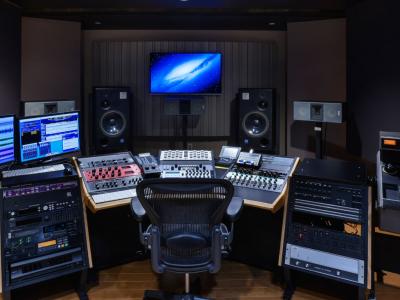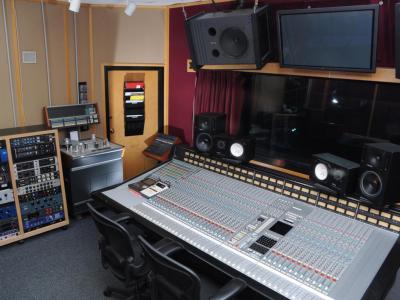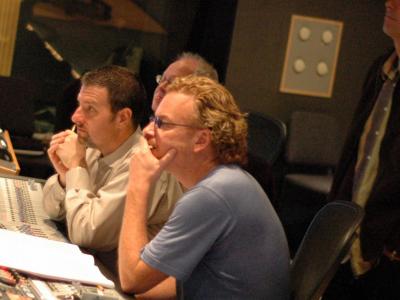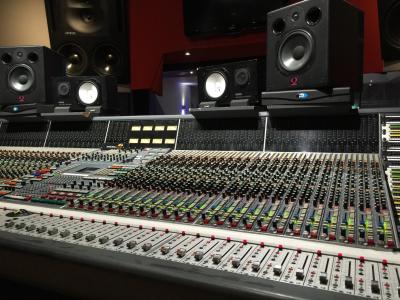Undergraduate Degree Program
Bachelor of Arts
Electronic Music Production and Sound Design Degree
• Get a decision within 1 week
• Apply in as little as 15 minutes
Learn current music production, sound design, and synthesis technologies to create professional electronic music compositions. This program will teach you to record, edit, and mix electronic music and sound design projects and will help you develop a deep understanding of electronic instruments by mastering a variety of synthesizer programming paradigms including subtractive, additive, FM, sampling, and granular. Upon graduation, you’ll have a portfolio of professional-quality sound designs and electronic music compositions to prepare you for a career in many areas of electronic music production, including sound design, digital audio editing, synthesist/producing, MIDI pre-production, multimedia development, performing, and more.
Upon completion of the Electronic Music Production and Sound Design major, you will be able to:
- Compose professional quality electronic music in a variety of current genres
- Develop a deep understanding of electronic instruments, mastering a variety of synthesizer programming paradigms, including subtractive, additive, FM, sampling, and granular, in order to create original sounds for electronic music compositions
- Analyze, identify, and creatively manipulate the properties of sound from a variety of sources, creating new and unique sound design assets
- Apply core studio technologies and techniques, including recording, editing, and mixing to electronic music and sound design projects
- Develop a unique voice as a composer and producer using a palette of original synthesized and processed sounds
- Create effective sound designs for visual productions and multimedia applications using a variety of sound processing techniques
- Create remixes of existing source material in a variety of genres
- Develop effective strategies for performing live electronic music
- Develop a portfolio of professional-quality sound designs and electronic music compositions to attain work as an artist, producer, remixer, or sound designer
Curriculum
(120 Credits)
-
Concentrate Courses (45 Credits)+
-
Complete the following (30 credits):
- OLMSC-101Music Production 101
- OMPRD-273Producing Music with Logic
- OMPRD-202Sound Design for the Electronic Musician
- OLMSC-260Sampling and Audio Production
- OMPRD-382Mixing and Mastering for the Electronic Musician
- OCWPR-397Composing and Producing Electronic Music 1
- OCWPR-398Composing and Producing Electronic Music 2
- OMPRD-341Max Programming: Introduction to Procedural Music
- OMPRD-402Creative Digital Signal Processing (DSP) for Music and Visuals
- OMPRD-495 Electronic Music Production and Sound Design Capstone
-
Complete one harmony course from the following (3 credits):
- OHARM-100Music for Beginners or OHARM-101Music Theory 101 or OHARM-104Music Theory Fundamentals or OHARM-105Music Application and Theory or OHARM-110Getting Inside Harmony 1 or OHARM-201Music Theory 201: Harmony and Function or OHARM-211Getting Inside Harmony 2 or OHARM-212Harmony 2 or OHARM-301Music Theory 301: Advanced Melody, Harmony, Rhythm or OHARM-412Reharmonization Techniques or OCOMP-110Music Theory and Composition 1 or OCOMP-111Music Theory and Composition 2 or OCOMP-210Music Theory and Composition 3 or OCOMP-211Music Theory and Composition 4
-
Choose one ear-training course from the following (3 credits):
- OEART-115Basic Ear Training or OEART-119Ear Training 1 or OEART-120Ear Training 2 or OEART-215Ear Training for Live Performance or OEART-320Harmonic Ear Training: Recognizing Chord Progressions
-
Choose one keyboard course from the following (3 credits):
- OPIAN-100Berklee Keyboard Method or OPIAN-150Keyboard for the Electronic Musician or OPIAN-200Piano Technique 101 or OPIAN-210Intermediate Keyboard or OPIAN-215Keyboard Technique for Songwriters or OPIAN-220Blues and Rock Keyboard Techniques or OPIAN-230Pop/Rock Keyboard or OPIAN-240Piano Scales 101 or OPIAN-245Piano Chords 101 or OPIAN-305Piano Technique 201 or OPIAN-310Piano and Keyboard Techniques for Session Musicians or OPIAN-315Jazz Piano or OPIAN-400Advanced Jazz Piano or OPIAN-405Keyboards for Live Performance: Techniques and Technology
-
Choose any two additional from the above or from the following (6 credits):
- OCMUS-105Time and Rhythm 1
- OCOMP-110Music Theory and Composition 1
- OCOMP-111Music Theory and Composition 2
- OCOMP-210Music Theory and Composition 3
- OCOMP-211Music Theory and Composition 4
- OCOMP-250Counterpoint
- OCWPR-130Arranging 1: Rhythm Section
- OCWPR-231Arranging for Horns
- OCWPR-250Arranging and Producing Contemporary Music Styles
- OCWPR-334Contemporary Vocal Arranging
- OCWPR-335Jazz Arranging
-
Elective Courses (33 Credits)+
-
Complete any eleven courses, except Liberal Arts courses coded with OLART, OLSOC, OLMSC, or OAFST in a given student's area of interest and professional development (e.g., music business, songwriting, arranging, orchestration, etc.). (33 credits)
-
Liberal Arts Courses (42 Credits) +
-
Complete one Composition/Writing (OLART) course from the following (3 credits):
- OLART-111 College Writing or OLART-201 Creative Writing: Literature Studies for Musicians or OLART-215 Creative Writing: Poetry or OLART-216 Creative Writing: Finding Your Voice
-
Complete one History (OLART) course from the following (3 credits):
- OLART-170 Rock History or OLART-220 History of Film Music or OLART-231 Art History of the Western European Tradition or OLART-233 Music History of the Western World 1: Medieval, Renaissance, and Baroque or OLART-234 Music History of the Western World 2: Classical, Romantic, and Modern
-
Complete any four additional Arts/Humanities (OLART, OMPRD, OCDAN, OCTHR, OAFST) courses from the following (12 credits):
- OLART-100 Developing Your Artistry
- OMPRD-110 Music Video Production
- OAFST-110 Black Creative Expression: An Introduction to Africana Studies
- OLART-111 College Writing
- OLART-160 Digital Cinematography Fundamentals
- OLART-170 Rock History
- OLART-201 Creative Writing: Literature Studies for Musicians
- OLART-205 Game Design Principles
- OLART-215 Creative Writing: Poetry
- OLART-216 Creative Writing: Finding Your Voice
- OLART-220 History of Film Music
- OLART-231 Art History of the Western European Tradition
- OLART-233 Music History of the Western World 1: Medieval, Renaissance, and Baroque
- OLART-234 Music History of the Western World 2: Classical, Romantic, and Modern
- OLART-400 Career and Job Success in the Music Industry
- OMPRD-250 Music Video Editing with Final Cut Pro
- OMPRD-251 Creative Video Editing with Adobe Premiere
- OCDAN-103 Iconic Dance and Urban Movement
- OCTHR-103 Script Analysis for Theater
-
Complete four Social Sciences (OLSOC) courses from the following (12 credits):
- OLSOC-100 Wellness for Artists: Music, Movement, and Mindfulness
- OLSOC-150 The Language of Film and TV
- OLSOC-180 Project Management for Musicians
- OLSOC-200 Business Communications
- OLSOC-210 Music, Self, and Society
- OLSOC-226 New Media Economics: Music, Mobile, Gaming, and Online Markets
- OLSOC-307 Music Cognition
-
Complete four Math and Physical/Natural Sciences (OLMSC, OMPRD, OMBUS) courses from the following (12 credits):
- OLMSC-130Applied Mathematics for Musicians
- OLMSC-150Computer Programming Fundamentals
- OLMSC-200A Scientific Approach to Nutrition and Health for Performing Artists
- OLMSC-215Acoustics
- OLMSC-250Music and Neuroscience
- OMPRD-210Audio Fundamentals for Recording
- OMBUS-475Music Business Finance
How should I set up my schedule, based on the above requirements?
Check out this handy planning guide to help you understand which courses you should take during which semester.
View Sample ScheduleHow to Apply
Your time is valuable, and our online application makes applying as straightforward as possible.
-
Create an account in our application portal, and complete / submit your online application. You'll need:
- A 500-750-word essay, or a 3-5-minute video essay
-
The email addresses / contact information of two recommenders who will provide your letters of recommendation
Start / Resume Your Application
-
Nice! After submission, be sure to order your official transcripts.
- A 500-750-word essay, or a 3-5-minute video essay
- The email addresses / contact information of two recommenders who will provide your letters of recommendation
Read the full details of undergraduate admission requirements here.
Save
65%
Online undergraduate degree tuition vs. campus tuition
Affordable Tuition
Online undergraduate degree tuition is $62,150 for 120 credits (includes associated fees). To get started, this degree program includes a non-refundable $75 application fee.
Read full tuition and associated program fee details for this, and all other undergraduate programs here.
Available Financial Aid
Ready to Return to Berklee or Transfer in Credits from Another Institution to Complete Your Degree?
Students transferring in from an accredited institution can carry over up to 60 credits, and students with previous Berklee experience may be able to transfer even more.
Learn about our different transfer options:












